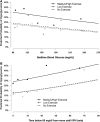Factors associated with nocturnal hypoglycemia in at-risk adolescents and young adults with type 1 diabetes
- PMID: 25761202
- PMCID: PMC4432491
- DOI: 10.1089/dia.2014.0342
Factors associated with nocturnal hypoglycemia in at-risk adolescents and young adults with type 1 diabetes
Abstract
Background: Hypoglycemia remains an impediment to good glycemic control, with nocturnal hypoglycemia being particularly dangerous. Information on major contributors to nocturnal hypoglycemia remains critical for understanding and mitigating risk.
Materials and methods: Continuous glucose monitoring (CGM) data for 855 nights were studied, generated by 45 subjects 15-45 years of age with hemoglobin A1c (HbA1c) levels of ≤8.0% who participated in a larger randomized study. Factors assessed for potential association with nocturnal hypoglycemia (CGM measurement of <60 mg/dL for ≥30 min) included bedtime blood glucose (BG), exercise intensity, bedtime snack, insulin on board, day of the week, previous daytime hypoglycemia, age, gender, HbA1c level, diabetes duration, daily basal insulin, and daily insulin dose.
Results: Hypoglycemia occurred during 221 of 885 (25%) nights and was more frequent with younger age (P<0.001), lower HbA1c levels (P=0.006), medium/high-intensity exercise during the preceding day (P=0.003), and the occurrence of antecedent daytime hypoglycemia (P=0.001). There was a trend for lower bedtime BG levels to be associated with more frequent nocturnal hypoglycemia (P=0.10). Bedtime snack, before bedtime insulin bolus, weekend versus weekday, gender, and daily basal and bolus insulin were not associated with nocturnal hypoglycemia.
Conclusions: Awareness that HbA1c level, exercise, bedtime BG level, and daytime hypoglycemia are all modifiable factors associated with nocturnal hypoglycemia may help patients and providers decrease the risk of hypoglycemia at night. Risk for nocturnal hypoglycemia increased in a linear fashion across the range of variables, with no clear-cut thresholds to guide clinicians or patients for any particular night.
Trial registration: ClinicalTrials.gov NCT01591681.
Figures


References
-
- Ly TT, Maahs DM, Rewers A, Dunger D, Oduwole A, Jones TW: Assessment and management of hypoglycemia in children and adolescents with diabetes. Pediatr Diabetes 2014;15(Suppl 20):180–192 - PubMed
-
- Harris S, Mamdani M, Galbo-Jorgensen CB, Bogelund M, Gundgaard J, Groleau D: The effect of hypoglycemia on health-related quality of life: Canadian results from a multinational time trade-off survey. Can J Diabetes 2014;38:45–52 - PubMed
-
- Tanenberg RJ, Newton CA, Drake AJ: Confirmation of hypoglycemia in the “dead-in-bed” syndrome, as captured by a retrospective continuous glucose monitoring system. Endocr Pract 2010;16:244–248 - PubMed
Publication types
MeSH terms
Substances
Associated data
Grants and funding
LinkOut - more resources
Full Text Sources
Other Literature Sources
Medical

